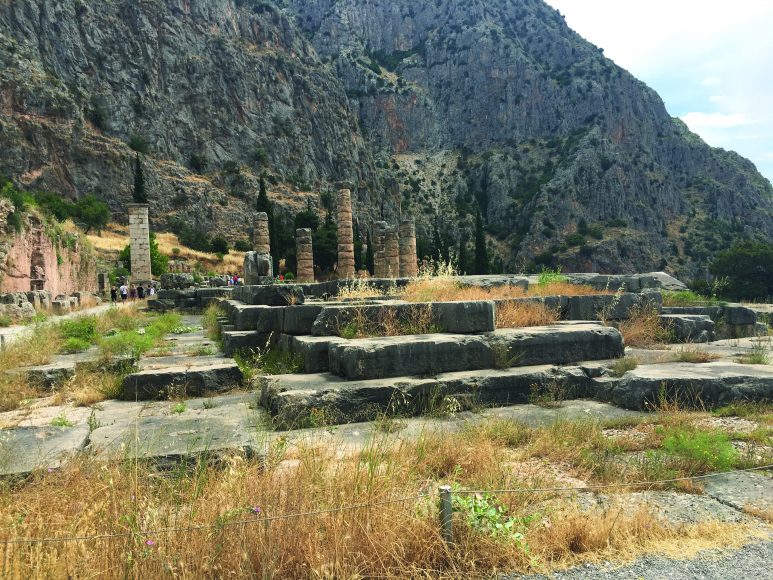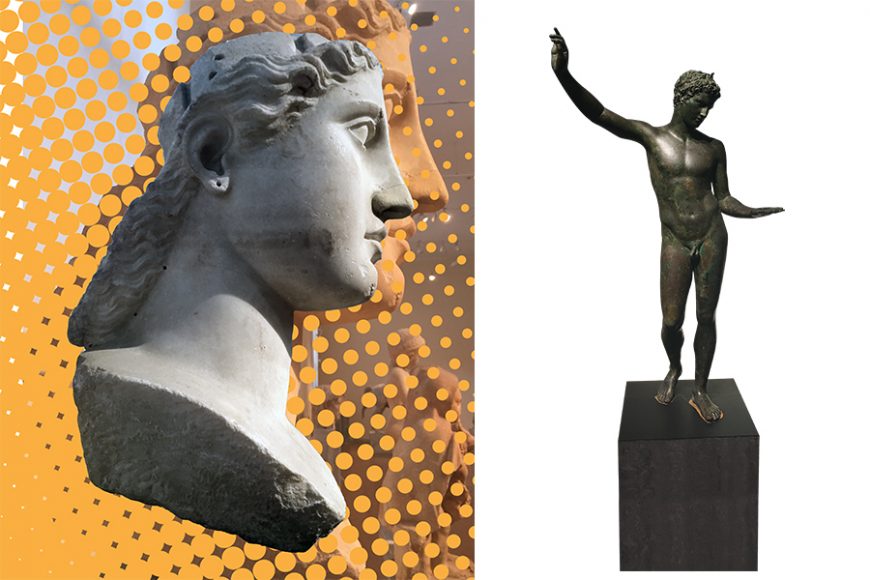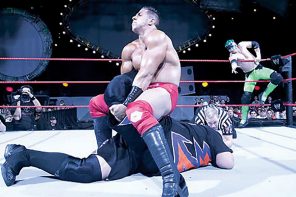The waves danced on the Thermaic Gulf like the beating wings of seagulls, while the birds themselves engaged in frenzied flight amid the terraced arcades of Aristotelous Square as if driven by the inexplicable longing in the melodies of the young street musicians below. Or perhaps the longing was merely my own.
I had returned to Greece on another “Legacy of Alexander the Great” tour to see if I could be another self, which is to say a better self. On the excellent New York Times Journeys’ tour, which I wrote about in the October 2016 issue of WAG, I had nonetheless been distracted by the demands of a first-time visit and an assignment about the perilous state of the Greek economy. Now traveling with The Metropolitan Museum of Art through Arrangements Abroad, I was determined to do something I rarely do — resist turning my vacation into a working one.
Which is not to say that I wanted to do nothing. Rather, I yearned to engage in something that was as intellectually stimulating as my work but at a different pace — affording me the time to think, read, shop, walk, sightsee, explore or merely gaze at the light-dappled sea from my balcony at the Electra Palace Hotel in Thessaloniki, Greece’s secondlargest city, and later wonder at the Parthenon from the Hotel Grande Bretagne’s Roof Garden Restaurant in Athens.
In this I was guided by the philosopher Aristotle — tutor of Alexander the Great, the Greco-Macedonian conqueror of the Persian Empire and disseminator of Greek culture whom I’ve been passionate about since I was a child. More precisely, I would be guided by Edith Hall’s recent book “Aristotle’s Way: How Ancient Wisdom Can Change Your Life,” in which she describes the Aristotelian idea of leisure as “the ideal human state,” one that encompasses intellectual activity for its own sake, R & R, exercise and entertainment as the means “in which our full potential for happiness can be realized.”
I encountered many of these facets of leisure on the 12-day tour, which swept us from Thessaloniki south by plane to Athens, with day trips by bus in between to such places as Pella, the second capital of Macedon, the northern Greek kingdom that was Alexander’s homeland; Vergina, Macedon’s original capital and burial place of Alexander’s father, Philip II, and son, Alexander IV; the seaports of Kavala and Nafplio, reminiscent of Monaco and Santa Barbara; and the equally picturesque village of Lydia in Kavala and Litochoro in the foothills of Mount Olympus. In a sense, The Met’s Alexander tour was the same thing only different. Our collegial group of 17 — led by Met lecturer Frank Dubell, an urbane expat Brit based in Rome whom some of the tour ladies took to calling Mr. Darcy after Jane Austen’s “Pride and Prejudice;” tour director Manuela Solaro del Borgo, whose every elegant outfit we awaited each day; and local guide Maria Papadopoulou, a force of nature right out of the ancient myths — visited many of the same places I did in 2016, including Vergina. (It is a place of such power, wealth and death that it forces you to confront your own mortality. For many, it was once again the high point of the tour.)
But we also visited many sites we did not on the Times’ tour, had more time to explore on our own and lodged in far greater luxury, particularly at the Grande Bretagne, overlooking the Greek Parliament in the heart of Athens, where many of us were upgraded to suites. Despite some miscommunication and questionable restaurant choices and menus — a case of a too much of a good thing where lavish Mediterranean lunches were concerned — The Met tour was a superior experience.
Walking with the gods
Among the pleasures of the northern portion of our mainland journey was the archaeological site of Dion, in the shadow of misty, mythic Mount Olympus, home of the gods. Zeus and his fellow Olympians must have decreed the day themselves for despite the mid-90s heat and humidity that permeated the entire June trip, a breeze wafted through the site, whose ruins speak to multiple influences, including a small but choice statue of Isis, the Egyptian mother goddess; Greek stone columns and a brick Roman bath, complete with a square privy. What makes the expansive, relatively unattended Dion delightfully different from other sites — like Delphi, home to an oracle famously visited by Alexander and a disappointing tourist trap — is that it is fairly level for walking, with no soaring acropolis to climb and an abundance of plants that attracts flitting butterflies and warbling birds alike.
“You ladies look like a group of Arcadian shepherdesses,” Frank said to us women as we sat in a thicket, brimmed hats and parasols on display, as if we had stepped out of one of the many later paintings of ancient Greece’s pastoral past.
The tour did not pay homage to classical antiquity alone. After visiting Philippi — renamed by Alexander’s father, Philip, and site of both St. Paul’s imprisonment and, earlier, an epic battle between Julius Caesar’s assassins and his victorious champions — we stopped briefly at the village of Lydia, named for the Jewish-sympathizing purple dye merchant who was baptized by Paul, becoming the first European converted to Christianity. The Baptistery of St. Lydia that is part of the Church of Saints Lydia and Paul, built in 1975, is a little jewel, covered in gem-colored icons and gilt mosaics and overlooking an outdoor shrine and the cool stream that provided Paul and Lydia with the waters of rebirth. It was the kind of quiet, off-the-beaten path moment that defined the tour, exemplifying the refreshment of mind, body and soul that Aristotle spoke of as the essence of leisure.
Shopping till we dropped
Journeying south to Athens, we made the National Archaeological Museum our first museum stop. This is a cultural marvel, housing the largest collection of Greek antiquities in the world. I, however, skipped the superb permanent collection to feast on two special exhibits. The first, on the Roman Emperor Hadrian, contained a superb bust of his lover Antinous, a Bithynian Greek youth whose drowning death in the Nile was probably an act of self-sacrifice to save Hadrian’s reputation. The second exhibit, “The Countless Aspects of Beauty,” was a sensuous tour de force with a dramatically lit Aphrodite (Venus) amid the male and female nudes, perfumes to scent and the melancholy melismas that define Mediterranean music.
On the same day, we visited and lunched at the Benaki Museum of Greek Culture — based on the Benaki family’s eclectic private collection of icons, textiles, furnishings and jewelry, housed in their onetime home, whose tastefully curated gift shop reminded me of The Morgan Library & Museum in Manhattan.
“I think you came back to Alexander’s Greece just to shop,” one member of the group teased me. And indeed many of us indulged in retail therapy, particularly at the Plaka — just “Plaka” to the Greeks — a 10-minute walk from the Grand Bretagne.
Plaka is a modern marketplace mix of boutiques, souvenir stalls and cafés nestled in the old city. (At one such shop, Ruby’s upscale jewelry store, my newfound friends dropped so much cash that I wound up with a free Greek-vanilla ice cream cone.) In Plaka, I was the proverbial kid in the candy store, snatching up Alex coins, jewelry, busts and statues that I crammed into a blue-gray floral “This Is Greece” hobo bag that I bought just for the occasion. Even a goddess of shopping, however, needs a break now and then so I settled down at the entrance table to a café — “You can be the greeter,” the owner said — to savor grilled eggplant stuffed with feta, tomatoes and onions and homemade lemonade garnished with mint as I watched the world go by.
At home alone in the world…and with others
On Pentecost Sunday (June 16 in the East this year) as the gang climbed the Acropolis — whose crown jewel is the Parthenon, temple of Athena, goddess of wisdom, crafts and just war, for whom Athens is named — I took myself off instead to St. Dionysius Areopagite Cathedral, a Roman Catholic church, for Mass in the Eastern rite, complete with a pronounced use of incense and the Communion wafer dipped in wine. Afterward, I found nourishment of a different kind at the Grand Bretagne’s Spa, where I had a mani-pedi with organic products and a cup of rooibos vanilla tea amid a burbling fountain and a bust of the Apollo Belvedere.
I was reminded then about how much I relish my own company, even as I enjoy that of others. As Aristotle understood, Edith Hall writes, “who you spend your leisure time with is as important as how you spend it.” At our final lunch in Nafplio, Greece’s original capital, I sang “Maria” in honor of our birthday girl tour guide who had fought for our place in the sun at every stop, even going toe-to-toe with a police officer in Thessaloniki to ensure a place for our bus to stop. My rendition received a rousing ovation from the group and other patrons. I will always remember that lunch along with our shopping expedition in Stavros, a resort where I bought a pink and cream striped dress in crinkly cotton that has become a favorite; and our drinks and dinner at the Grande Bretagne’s Rooftop Garden Restaurant, where the feta ravioli in bell pepper sauce was to die for.
At mealtime, we talked politics respectfully and also tried to avoid politics, commemorated the passing of Alexander (on June 11) — who, after all, had brought us together — and shared personal and professional losses. Travel, like tragedy, binds people. And those present remind you of those absent, who nonetheless make the journey with you.
I wasn’t prepared for such an intimate exploration of loss. Nor was I prepared for the bittersweet pang I felt in parting. Tour groups, Hall suggests, belong to what Aristotle would call utility friendships — mutually beneficial but limited and fleeting.
Yet even in loss, Aristotle says, we can take comfort, for we remain ourselves. And no one can take that or the relationships we have had away from us.
For more, visit metmuseum.org/travel and arrangementsabroad.com.






